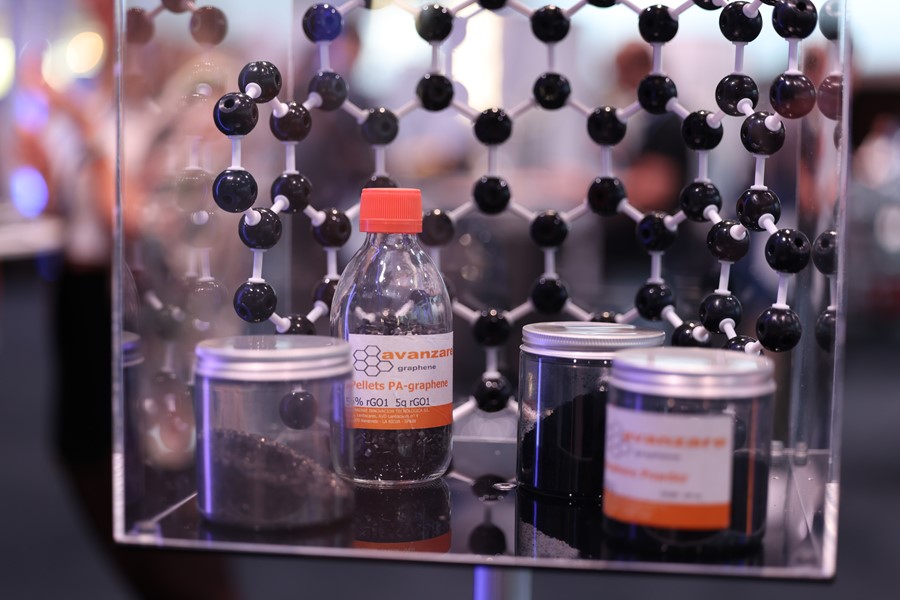Global graphene market will continue to grow, researchers find
Meta-market analysis identifies composites, batteries and electronics as major application areas likely to drive the overall development of the graphene market towards mass production.
Since its practical isolation in 2004, graphene and related materials sparked enormous expectations in terms of technological application opportunity and potential economic value. In this context, a new peer-reviewed scientific publication in the journal 2D Materials from researchers at Graphene Flagship partner Fraunhofer ISI provides insights into the projected development of the emerging graphene market, specific segments and possible applications. The market expectations are aggregated from commercial market reports and complemented by bibliometric and patent analyses. The results provide deeper insights into the global market landscape and its key actors. In particular, the meta-market analysis focuses on composites, batteries and electronics as major application areas likely to drive the overall development of the graphene market towards mass production.
Graphene and related materials (GRMs) promise ample application potential throughout numerous industries. A dedicated graphene market gradually forms around emerging suppliers aspiring to satisfy future demands. Its growth critically depends on the interplay of supply stream maturation and initial utilisations to drive the demand. However, what is still missing are detailed insights into the current state and future development of the emerging graphene market which is required, for example, by producers in order to grow their customer bases, secure funding or scale up their production.

The global graphene market has been continuously growing over the last years to reach an average estimated global annual revenue of 380 million US$ in 2022. Significant market growth over the next years will lead to a predicted market size of 1.5 billion US$ in 2027.
2D Materials
New meta-market analysis provides quantitative and qualitative insights into the global graphene market
A new meta-market analysis, whose results have now been published in the scientific journal 2D Materials, addresses this lack of information and provides insights into the global graphene market landscape and its key actors. In a first step, 103 English language market reports covering the global graphene market with publication dates ranging from 2013 to 2022 were analysed and relevant preview information, in particular quantitative market figures such as revenue estimates or forecasts on the compound annual growth rate, were examined. In a second step, comprehensive publication and patent analyses down to actor level were conducted in order to provide deeper insights.
A first result of the study is that the number of graphene market reports has clearly increased, particularly over most recent years (2020–2022), which already underlines the rising interest in the industrial uptake of graphene. It seems that more and more customers are willing to pay for such market reports in order to get the necessary information about the global graphene market landscape.
The global graphene market will keep growing continuously
The findings also show, that the global graphene market has been continuously growing over the last years to reach an average estimated global annual revenue of 380 million US$ in 2022 (forecast range between 50 million and 1.1 billion US$). This is still significantly smaller than e.g. the graphite market (22.5 billion US$ in 2022) or the carbon black market (17 billion US$ in 2021), but the short time since its discovery for practical use has to be considered here. Significant market growth over the next years will lead to a predicted market size of 1.5 billion US$ in 2027 (forecast range between 0.34 and 5.5 billion US$).
Concerning the compound annual growth rate (CAGR) for the global graphene market, more than 85% of the market reports forecast growth rates of more than 20%, still 70% of the reports expect a CAGR of more than 30% in the near- to medium-term future. In this context, information about the development of the graphene price and production volumes are also of high relevance: The meta-market analysis derives an expected annual price reduction rate of 12% based on the volume demand and revenue forecasts for graphene powder/platelet material until 2028. According to the study, the global graphene demand could increase to a range of 9,000 and 170,000 tons per year in 2028, with a median of 30,000 tons. These numbers give a rough estimate of the demand development of graphene in the next years and the wide range is typical for markets with highly uncertain development. The actual demand development will, of course, depend on the performance of graphene materials in application cases, the actual price developments, corporate decisions and the thus resulting market adoption.

Three promising application sectors for graphene were analysed in the study
Having now a closer look on the utilisation side of the market landscape, key actors and possible applications, the study analysed three promising application sectors for graphene: electronics, composites and batteries. The estimations for the current market revenue for the graphene battery market (approx. 100 million US$ in 2022) and the expected growth (CAGR between 20 and 30%) are rather consentaneous. This is not the case for the graphene electronics market, where the predictions for revenue values reach from below 100 million US$ to more than $1 billion and for growth rates reach from below 20 to almost 40%. Even more drastic are the variations in the graphene composite market estimations, reaching from revenue values of below $20 million to almost $12 billion in 2022 and growth rates between 3.5% and 40%. Beyond differing expectations, also deviating definitions of graphene markets (such as inclusion or exclusion of secondary products) by market report provides may drive the massive spread between expected market volumes.
Comparison of transnational patenting activity
The study authors also analysed the global distribution of transnational patenting activity for electronics, composites and battery applications over the national origin of inventors. The findings show that the three world regions of North America, East Asia and Europe largely dominate global graphene intellectual property generation at nearly comparable shares so far. Of course, some regional trends can be observed, such as a specific focus on graphene utilisation in batteries in East Asia, which is consistent with their current industrial leadership in overall battery technology.
Henning Döscher, researcher at Fraunhofer ISI and one of the four authors of the publication, states, “Emerging niche players largely dominate graphene production so far. They also venture in promising application fields, where the market leaders usually still ignore opportunities arising from graphene. However, some already began to build up significant graphene application such as Samsung in the electronics sector.”
If the global graphene market will grow by 20 to 30% in the next years, as predicted by the market reports analysed in the study, such companies will have an advantage because these enormous growth rates require graphene producers to scale up their production capacity rapidly – on average by 35% each year.
Emerging niche players largely dominate graphene production so far. They also venture in promising application fields, where the market leaders usually still ignore opportunities arising from graphene. However, some already began to build up significant graphene application such as Samsung in the electronics sector.”
Researcher at Fraunhofer ISI and roadmapping leader for the Graphene Flagship





